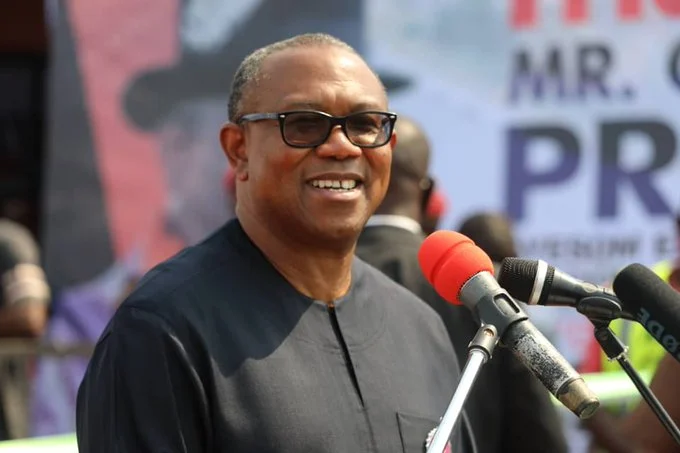- News
- No Comment
2023 Election: Obi Leads Tinubu, Atiku In NOI Popularity Poll

– As Kwankwaso Came A Distant 4th
If the 2023 election holds today, Peter Obi, the candidate of the Labour Party (LP), will trounce Asiwaju Ahmed Bola Tinubu of the All Progressives Congress and Atiku Abubakar, of the Peoples Democratic Party (PDP) to emerge the next Nigerian President after the incumbent, Muhammadu Buhari.
That is the outcome of the result of the polls conducted by NOI, Nigeria’s most influential polling agency, with a high level of accuracy in recent years, with a history of not failing in their prediction since going into business since Nigeria returned to electoral democracy in 1999.
The poll commissioned by ANAP Foundation, saw the candidate of the New Nigerian Peoples Party (NNPP), Rabiu Kwankwaso, coming distant fourth, while the remaining 14 other candidates, scoring less than one per cent, according to versatile banker, Ataedo Peterside, who is the foundation’s Chairman.
Peterside, who was a guest on Arise Television’s breakfast programme, The Morning Show, told his hosts that since the reputation of the NOI informed the confidence of the foundation to trust in the accuracy of the outcome, given that in similar polls, particularly in the last three election seasons – 2011, 2015 and 2019, the agency predicted rightly.
Details of the poll, showed Obi leading with 21 per cent, while both Tinubu and Atiku were tied in second place with 13 per cent each and Kwankwanso, whose discussion with his LP counterpart for a collaboration, failed on account of disagreement over who should run the ticket and who should be the running mate, came distant fourth with only three per cent.
Peterside, said the poll was concluded in early September 2022 with each of the respondent asked the same question, “suppose the presidential election is being conducted today, who are you likely to vote for.”
In an earlier statement, before his TV appearance, he said: “The poll revealed a substantially close race between Mr. Peter Obi of Labour Party (LP), Asiwaju Bola Ahmed Tinubu of the All Progressives Congress (APC) and Alhaji Atiku Abubakar of the People’s Democratic Party (PDP).
“Running significantly behind the leading pack is Dr. Rabiu Kwankwaso of the New Nigeria Peoples Party (NNPP) who is the lone outsider. All other contestants polled results that are statistically insignificant.
“The results showed a significant lead for Mr. Peter Obi with 21% of voters proposing to vote for him if the presidential election were to be conducted today; and 13% each proposing to vote for Asiwaju Bola Ahmed Tinubu and Alhaji Atiku Abubakar who are both tied in second place. Dr. Rabiu Kwankwaso was a distant fourth with 3% of voters proposing to vote for him.
“Mr. Peter Obi’s 8 percentage point lead at this early stage is significant, but not sufficient to separate him completely from a leading pack of candidates scoring 21%, 13% and 13% respectively.
“Undecided voters and those who prefer not to reveal their preferred candidate add up to a whopping 32% and 15% respectively. The gender split of undecided voters shows that 39% of women are undecided versus 27% of male voters.”
He said the percentage of registered voters among the respondents stood at 99 per cent in the North East, 90 per cent in the South, the North Central and the North West respectively, while the lowest percentages were recorded in the Southeast with 88 per cent and the Southwest with 85 per cent.
When asked if respondents were aware of the various candidates vying for the Presidency, data gathered showed that 99 per cent of the respondents were aware of Tinubu, 98 per cent were aware of Atiku, 95 per cent were aware of Obi, while 74 per cent were aware of Kwankwaso of the NNPP adding that other candidates scored below 55 per cent in terms of name recognition.
Furthermore, the data from the wide-ranging poll summarizes top five reasons why voters are more inclined to vote in the forthcoming elections, these include: – the need to tackle insecurity (45 per cent), the Economy (20 per cent), Education (9 per cent), Unemployment (7 per cent) and Poverty alleviation (4 per cent).
The result also showed that 46 per cent of the respondents said they wanted to see their preferred presidential candidates participate in a televised interview and, or debate, with the interview, debates spanning across topics like their party manifestos, issues of Security, Economy, Education, Job Creation, Healthcare and Agriculture, amongst others.
The statement, added: “It is worthy of note that 69% of those aged 18-25, 76% of those aged 26-35, 77% of those aged 36-45, 87% of those aged 46-60 and 89% of those aged 61+ responded saying that they would definitely vote in the coming elections.
“The age groups that expressed the greatest willingness to vote were those between 46-60 and 61+ years. On average, the Poll shows that almost 8 in 10 registered voters are absolutely certain that they would be voting in the next presidential election. If they stay committed, then we could witness a huge turnout in the February 2023 elections.
Furthermore, Peter Obi led the pack in virtually all the age categories i.e., his leadership was not confined to the youths only.
“While these Poll results show some significant trends, it is key to note that the battle ahead lies in the hands of the undecided/swing voters, as it appears they would ultimately decide which candidate takes the lead to emerge as the President of the Federal Republic of Nigeria in the 2023 presidential elections.
“In summary, our September 2022 Polls are inconclusive in terms of establishing a clear winner, as the undecided voters are large enough to turn the tables.
However, ANAP Foundation has concluded that the trends are clear enough to establish the front runners and so our subsequent polls will concentrate on the four leading candidates only.”
Culled From Whirlwind
